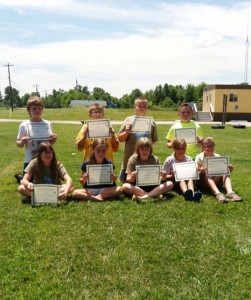Last week, Rumpke joined the Brown County Soil and Water Conservation District and Adams-Brown Recycling to host the third annual “Green Camp” for Brown County students interested in environmental health. Green Camp lasts three days for students who are new to the program and hosts an additional, advanced camp day for returning graduates.
The first day of Green Camp was hosted by Rumpke. The nine fifth- and sixth-grade students participating in Green Camp learned about their local waste collection by visiting the Georgetown Landfill The students toured the facility to learn about landfill construction and maintenance.
“It is important to teach kids early on what happens to the trash that their family produces once it is set out at the curb,” said Georgetown Landfill manager, Jim Hext. “Rumpke likes to explain how a landfill is built and operated with all the safeguards and technology in place to protect the environment and provide a safe disposal option for the surrounding communities.”
After the tour, the students made colored bracelets out of soda can tabs and continued learning about landfill construction by making their own edible landfills.
The following day, students toured the Adams-Brown Recycling facility to learn about the recycling process and the importance of reducing waste. While at the facility, students made their own recycled paper bookmarks.
On the final day of Green Camp, students explored a local creek and learned more about animals from Danielle Thompson, the education and wildlife specialist for the Brown County Soil and Water Conservation District. After a pizza celebration, the students (pictured above) graduated Green Camp with a certificate of completion as well as backpacks full of materials to help them continue exploring.
Experienced campers who have previously completed the program were invited back for an extra day of in-depth learning. This year’s advanced camp focused on the study of birds and saw 22 returning campers. Students dissected owl pellets to learn more about the digestive habits of birds. Advanced camp ended with a presentation by Cliff Caldwell, a specialist from the U.S. Department of Agriculture about controlling bird population, specifically surrounding landfills.
About the author: Darby Fledderjohn is the corporate communications intern.